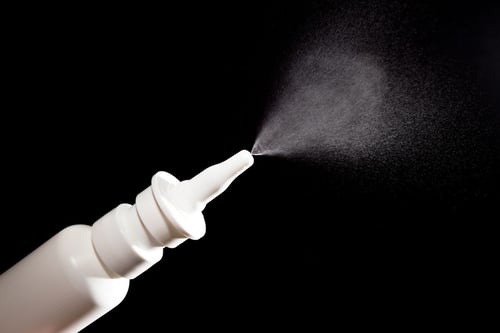Nasal sprays, otherwise known as decongestant nasal sprays (DNSs) are little spray bottles that can be inserted into the nose to clear up congestion or sinuses. They are extremely helpful for people with allergies or colds who have a difficult time breathing through the nose (especially when lying down) or who suffer from congestion-induced migraines.
This article will answer all your questions about nasal spray addiction, like: why are nasal sprays addictive, what are the signs of nasal spray dependence or addiction, what is rebound congestion, and what assistance is available for nasal spray addiction. Read on for more information.

Can You Get Addicted to Nasal Spray?
So, is nasal spray addictive? Yes, surprisingly, nasal spray can become addictive. However, nasal spray addiction differs from other forms of addiction as it does not cause psychological dependence. Nasal sprays do not produce the classic euphoric ‘high’ that other substances can cause. Rather, the person can become physically dependent on the spray, causing them to crave it and continue using it despite its negative effects on the brain and body.

How Does A Nose Spray Addiction Develop?
People who are congested may rely on nose sprays to help them breathe easily through their noses. Some sprays are designed to be used short-term, but people struggling with an elongated cold or allergies may be tempted to continue using the spray regardless of the recommended limitations (regular guidelines are no more than 3 days).
Using the spray more than recommended perpetuates the congestion instead of curing it, because it causes the nasal passages to swell. Swollen nasal passages cause congestion in the nose, so the user becomes increasingly dependent on the spray to keep the airways clear. This cycle goes on and on, with the person developing progressive tolerance and dependence on the spray, which can lead to addiction.
What is Rebound Congestion?
Rebound congestion, also known as rhinitis medicamentosa, occurs when overuse of nasal decongestant sprays leads to increased nasal blockage. When someone uses these sprays more frequently or for a longer duration than recommended, the nasal passages can become dependent on the medication. As the effect of the spray wears off, congestion returns—often worse than before—prompting continued use. This creates a cycle of dependence, where the spray intended to relieve symptoms ends up making them more severe.

Types of Addictive Nasal Sprays
Some nasal sprays can be obtained over-the-counter, whereas others require a prescription from a medical provider. It’s important to be aware of which kinds of sprays can become addictive:
- Nasal steroids sprays- these include Flonase®, Nasocort®, Nasonex®, and Rhinocort®. These are not addictive, and can be obtained over-the-counter. In fact, nasal steroid sprays should be used for a few weeks before the allergies start, to allay the symptoms.
- Nasal antihistamine sprays- including Asteline®, Patanase®, and Dymista ®, most of which can be obtained over the counter. Like their steroid counterparts, antihistamine sprays aren’t addictive and should be used regularly to prevent severe allergy symptoms.
- Saline nasal sprays- sometimes described as saline moisturizing spray or saline mist, these sprays are based on a salt-water solution and likewise do not carry a potential for abuse.
- Decongestant nasal sprays- these are sprays that contain either Oxymetazoline or Neosynephrine and are used when experiencing a cold. They could be recognized by the brand names Afrin®, Sinex, and Sudafed nasal spray. They are very effective for clearing congestion, and can usually be obtained over the counter. However, it is recommended to use the spray for 3 days only, since they ARE addictive. Follow the guidelines on the packaging and be aware that if you take it more than the recommended amount of time, you may become addicted to it.
Types of addictive nasal sprays:
- Afrin®
- Sinex
- Sudafed
Signs and Symptoms of Nasal Inhaler Addiction
If you suspect that you or your loved one may be addicted to nasal sprays, familiarize yourself with the signs and symptoms so you have the knowledge you need to make an informed assessment:
- Using nasal sprays for a longer duration or at a greater frequency than prescribed.
- Needing to constantly use nasal sprays so the nose can function as usual.
- Continuous coughing, sneezing, stuffiness, runny nose, and congestion.
- Needing to use increasingly more spray to achieve the same effects as previously.
- Experiencing withdrawal symptoms, like headaches, anxiety, worsened congestion, and restlessness, and when attempting to stop using sprays.
Risks and Side Effects of Nasal Spray Overuse
There are several short- and long-term effects of nasal spray overuse, some more severe than others. Although the effects are mostly physical because nasal sprays are not psychologically addictive, there are some emotional effects as well. Here are some adverse side-effects:
- Damage to nose tissues: As explained above, overuse of nasal sprays can cause chronic stuffiness. This means that the nasal tissue is perpetually swollen, leading to long-term damage.
- Nosebleeds and sinus infection: Constant misuse of nasal sprays causes dysfunction to the nasal cavity, leading to nosebleeds, sinus infection, and general discomfort in the nose.
- Loss of smell: As the nose functions continue to decrease, the sense of smell is negatively affected.
- Anxiety: Users may experience anxiety or agitation when they do not have easy access to nasal sprays. This is because they are physically unable to breathe normally without using the spray.
How to Prevent Nasal Spray Addiction
The most effective prevention for nasal spray addiction is following the guidelines on the packaging. If the guidelines suggest using the spray for 3 days only, do not dismiss it as a mere suggestion- ensure you stick to the guidelines and seek alternative relief for the congestion.
How To Stop Using Nasal Spray
People who are addicted to nasal sprays may balk at the idea of stopping to use the spray they rely on for regular function. In fact, quitting the nasal spray cold turkey will cause the nasal tissue to swell, making it supremely uncomfortable and even dangerous.
The best solution is to switch to a non-addictive spray. You can use a steroid-based spray, saline-based spray, or an antihistamine spray. In order to wean off the addictive spray, you need to gradually lower the dosage until the nose returns to normal function. After about six months, the nasal spray tolerance should disappear completely.
Conclusion
Following the guidelines above, you can determine whether or not you are struggling with a nasal spray addiction. Being dependent on any substance can cause unpleasant short- and long-term effects. Reach out today to Avenues Recovery to gain control over your life, and live an existence of serenity.


